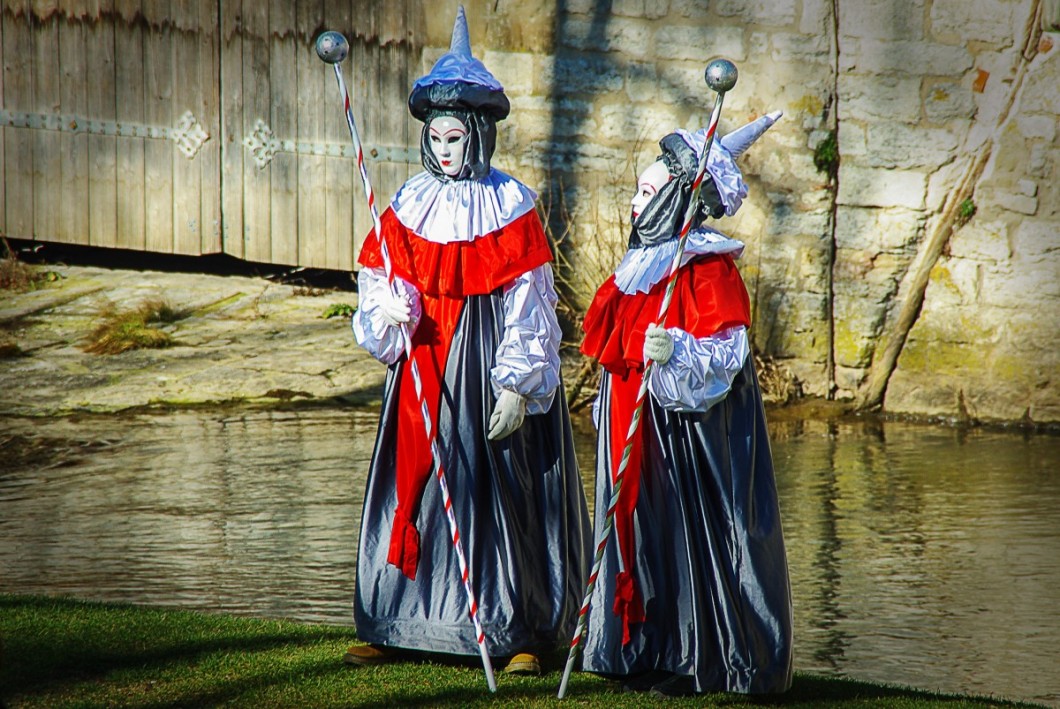Just a few more days and it is here again, the festival that makes all other festivities pale by comparison, the Mother of all Festivals: Carnival. One half of the Netherlands is horrified by the idea of dressing up, boozing and puking for three days straight; the other half saves up for it all year. For northerners, next week is a week like any other; southerners are getting ready for an orgy of feasting and celebration. (Ook in het Nederlands beschikbaar.)

Let’s get one big misconception out of the way straight away, a prejudice cherished like no other above the great rivers: carnival is NOT about boozing, stuffing yourself, and having sex. And I know what I’m talking about. Having grown up as a carnival-hating Hollander, I have joined the festivities and plunged into the carnival hustle and bustle at Oeteldonk for over 20 years (for the northerners among us, that’s Den Bosch). There’s obviously a fair amount of alcoholic beverages being consumed, along with no small number of local greasy snacks, but every person from Brabant knows that that’s not really what it’s all about. Of course, there’s a lot of necking, flirting and petting going on, but every person from Limburg knows that carnival is really about something else.
Festival of reversal
Carnival is the festival of reversal, of the subversion of the societal status quo. A temporary suspension of societal and social boundaries. During carnival there is no rich or poor, no successful entrepreneurs or lowly street workers, no blacks, no whites, no males, no females, just people having a good time, good-naturedly patting each other on the shoulder, having a beer together while singing along with the umpteenth carnival song.
Councils of Eleven
Power in the towns and villages is symbolically handed over by mayor and aldermen to carnival princes, who, together with their Councils of Eleven, make sure that things run smoothly during the festivities. A farmers’ wedding is celebrated, with two people being joined in ‘unholy’ matrimony, and being wished all manner of bad and nasty things, including a flock of kids. In the Brabant and Limburg parades, local, regional, and national politics are ridiculed, and national hypes as well as extremely local incidents are made fun of in a tongue-in-cheek kind of way, hardly understandable sometimes for people from outside the community.
The origins of carnival are clearly religious. At Easter, Christians around the world celebrate that Jesus of Nazareth has risen from the grave. To prepare for this great feast, Christians (particularly Roman Catholics) traditionally fast and practice sobriety for a period of forty days leading up to Easter, a period known as Lent. Carnival is celebrating life with exuberance one last time before this forty-day fasting period begins. This may in fact actually be what the word ‘carnival’ is derived from, carne vale, ‘farewell to meat’. In Christian circles, fasting is often related to refraining from consuming meat products.
Vastenaovond
Every village and every town in Limburg and Brabant has its own carnival customs, which may be very different from one place to the next. The Limburg village of Grubbenvorst, for instance, has what is known as ‘Gekke Maandag’ (‘Crazy Monday’), a single day of carnival celebrated 12 days earlier than the festivities in the rest of the Netherlands. The reason for this is a historical one: the rich land owners did not want to lose their workers for three days straight, and refused to give them collective leave. So the workers took a day off collectively, 12 days earlier. In Limburg, we often find the term ‘Vastenaovond’ used (lit. ‘eve of fasting’) originally a reference to the last evening before the beginning of the fasting period on ‘Ash Wednesday’, but now used for the entire festival.
Carnival Mass
Also, for many people from Brabant and Limburg, carnival does not start until after they have attended Carnival Mass: in a surprisingly disciplined manner, hundreds of churchgoers in festive attire celebrate the Eucharist, asking for God’s blessing of the festivities. It makes carnival a festival predominantly of the south, in which Roman-Catholic devoutness still plays a significant role.
Carnival is a bit like matches of the Dutch national soccer team: you do not have to be a fan to understand that for a great many people these are the highlights of the year. And let’s be frank: three days of celebrations, who would pass up on that? Time to loosen the reins for a few days, step out of your everyday routine, pretend you are someone else for a while. You’ll feel reinvigorated and recharged, ready to take on the rest of the year, ready to enjoy good times, but more importantly ready to take on bad times.
Oh and incidentally, don’t yell ‘Alaaf’ in Den Bosch, they don’t use that expression there.
Source: Tilburg University.
